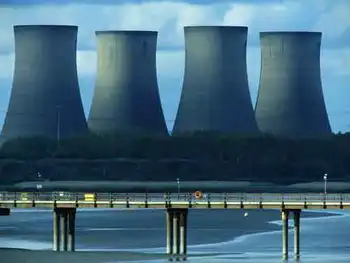Utilities scramble as flooding delays coal supply
By Associated Press
Arc Flash Training CSA Z462 - Electrical Safety Essentials
Our customized live online or in‑person group training can be delivered to your staff at your location.

- Live Online
- 6 hours Instructor-led
- Group Training Available
Union Pacific Corp., the largest U.S. freight railroad, said the floods' effects will reduce its quarterly earnings and rail industry stock prices were battered on Wall Street.
Power producers say the disruptions aren't yet causing shortages of coal supplies because they maintain stockpiles in case of such disruptions. American Electric Power Co. Inc., the nation's largest power producer, has "weeks" of coal reserves on hand, spokeswoman Melissa McHenry said.
Most electric utilities also purchase coal through long-term contracts at prices set well before the floods hit. That will limit the floods' impact on the prices paid by utilities, analysts said.
Meanwhile, several major railroads have either closed lines or are reporting delays of up to three days on shipments of all types of goods. Union Pacific spokesman Donna Kush said three of the six lines knocked out by floodwaters June 13 are still out of service.
The Omaha, Neb.-based company also said "network outages and disruptions" will reduce its second-quarter earnings by about 5 cents per share. That will put Union Pacific's profit towards the lower end of its prior estimates between 90 cents and 98 cents per share, according to a regulatory filing.
While other goods remain on hold, the railroad is pushing through carloads of coal because it's needed to maintain the nation's power supplies. Energy-related products, including coal and petroleum coke — derived from oil products and used as fuel — make up 20 percent of Union Pacific's total shipments.
Spokesmen for other major North American rails — including Burlington Northern Santa Fe Corp., Canadian Pacific Railway Ltd. and Norfolk Southern Corp. — said they aren't prioritizing any commodity shipments despite delays that remain across the board.
The delays could boost coal prices, which have more than doubled since the beginning of the year, analysts said.
"It's helping to tighten an already tight market," said Jeremy Sussman, an analyst at investment bank Natixis Bleichroeder Inc.
Futures prices for a ton of central Appalachian coal have jumped from $56 at the beginning of this year to almost $116, according to the Energy Information Administration.
The increase is largely due to increased demand from China, India and other developing countries, which has boosted U.S. coal exports. At the same time, domestic coal production has been flat, adding to the upward price pressure.
Railroads are diverting coal shipments away from flooded areas in Iowa, Missouri, Nebraska and Kansas, said Carol Raulston, a spokeswoman for the National Mining Association.
"We are having to reroute many of our train shipments," said John Austerberry, a spokesman for Detroit Edison, which provides electricity to 2.2 million customers in southeastern Michigan.
The company, a unit of DTE Energy Co., is having coal shipped north of the flooded area through Minneapolis and Chicago, Austerberry said. Columbus, Ohio-based AEP's regular coal shipments are detouring south of the flooded areas to its coal terminal in Metropolis, Ill., McHenry said.
The disruptions have sent railroad company shares off the rails. Shares of Union Pacific fell $3.59, or 4.7 percent, to $72.47 June 17, while CSX Corp. dropped $1.76 to $63.37, Norfolk Southern slipped $1.61 to $62.12, and Burlington Northern dipped $3.01 to $102.21.
The flooding also has affected other industries, rendering over 300 miles of the Mississippi River inaccessible to freight barges and other commercial traffic. That will slow the shipment of grain, coal, steel and iron, said Mark Parr, a steel industry analyst at Keybanc Capital.
The river closure also will hurt barge operator American Commercial Lines Inc., according to analysts at Stifel Nicolaus & Co. Inc., who estimated the delays will wipe out the Jeffersonville, Ind.-based company's expected 10 cent per share second-quarter profit. Shares of American Commercial Lines Inc. fell 44 cents, or 3.4 percent, to close at $12.44.











